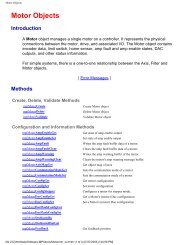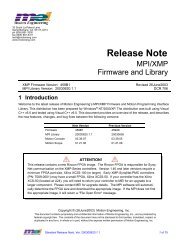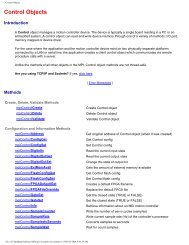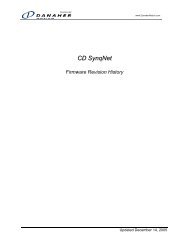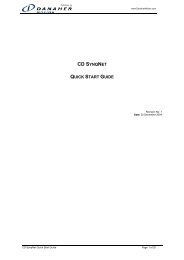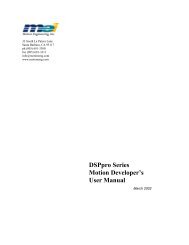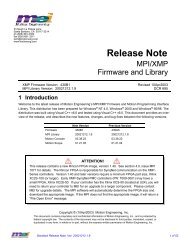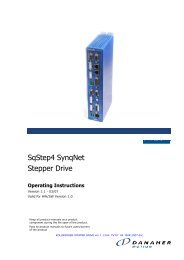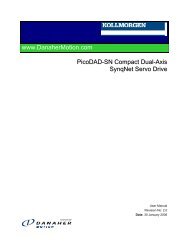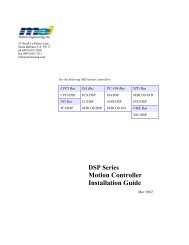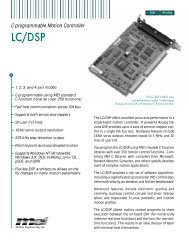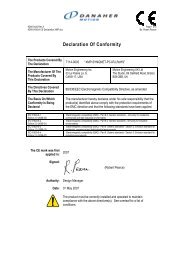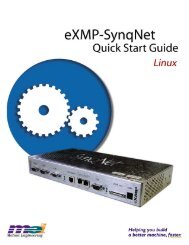Trace Objects - MEI's Technical Support
Trace Objects - MEI's Technical Support
Trace Objects - MEI's Technical Support
You also want an ePaper? Increase the reach of your titles
YUMPU automatically turns print PDFs into web optimized ePapers that Google loves.
<strong>Trace</strong> <strong>Objects</strong><br />
<strong>Trace</strong> <strong>Objects</strong><br />
Introduction<br />
Use the <strong>Trace</strong> module to selectively produce trace output on a global and/or per-object<br />
basis for your application. You can specify the types of trace output when an application<br />
is linked, or dynamically (by using a debugger).<br />
NOTE: You can also define your own trace function, using<br />
meiPlatform<strong>Trace</strong>Function(...) For example, you could define your own function to<br />
send traces to a circular memory buffer.<br />
The format of the trace output is determined by printf(...)-like trace macros located in<br />
MPI library source. The trace macros are of the form mei<strong>Trace</strong>#(mask, format, arg ...),<br />
where format and the args determine the trace output, and where # indicates the total<br />
number of arguments following the format argument (because macros cannot take<br />
variable numbers of arguments).<br />
The placement and content of the mei<strong>Trace</strong>(...) macros in the MPI library source is the<br />
responsibility of whomever maintains the library. Because trace can be added as<br />
desired, it is often useful to leave trace statements in the library source code rather than<br />
remove them, as is similarly done with debug printf(...) statements. It is also useful to<br />
define per-object trace output types so that the volume of trace output is set to a<br />
manageable level.<br />
The <strong>Trace</strong> module interface is declared in the XMP\include\trace.h header file. In order<br />
for your application to use <strong>Trace</strong> functions, you must build your application with the<br />
MEI_TRACE conditional-compile symbol defined.<br />
NOTE: Debug and DebugSingle are the only MPI library configurations that will<br />
produce trace output.<br />
To install trace, simply install the DLL for either the Debug or DebugSingle<br />
configuration. The Debug and DebugSingle configurations of the MPI library are built<br />
with the MEI_TRACE compile-time symbol defined.<br />
By default, trace output is sent to standard error. However, to send trace output to a file,<br />
your application can call the mei<strong>Trace</strong>File(char *fileName) function.<br />
To obtain the current global trace mask, call mei<strong>Trace</strong>Get(...).<br />
To modify the global trace mask, call mei<strong>Trace</strong>Set(...).<br />
To obtain an object's trace mask, call meiObject<strong>Trace</strong>Get(...) (defined in stdmei.h).<br />
To modify an object's trace mask, call meiObject<strong>Trace</strong>Set(...).<br />
file:///D|/pdfs/030100/html/Software-MPI/docs/<strong>Trace</strong>/trc_out.htm (1 of 2) [7/23/2004 11:45:45 AM]
<strong>Trace</strong> <strong>Objects</strong><br />
<strong>Trace</strong> Masks | Global <strong>Trace</strong> Outputs | Per-Object <strong>Trace</strong> Outputs<br />
Methods<br />
Configuration and Information Methods<br />
mei<strong>Trace</strong>Eol<br />
mei<strong>Trace</strong>File<br />
mei<strong>Trace</strong>Function<br />
mei<strong>Trace</strong>Get<br />
mei<strong>Trace</strong>MaskBits<br />
mei<strong>Trace</strong>Msg<br />
mei<strong>Trace</strong>MsgFunction<br />
mei<strong>Trace</strong>Set<br />
Set the end-of-line character to be used by <strong>Trace</strong><br />
Send trace output to a file<br />
sets function used to display a trace buffer<br />
Get global trace mask<br />
Convert the trace mask into an array of trace bits.<br />
Convert the message identification value into a string.<br />
Set a module's trace message function.<br />
Set global trace mask<br />
Data Types<br />
MEI<strong>Trace</strong><br />
MEI<strong>Trace</strong>Function<br />
MEI<strong>Trace</strong>Mask<br />
MEI<strong>Trace</strong>MsgFunction<br />
Constants<br />
MEI<strong>Trace</strong>MaskGLOBAL<br />
file:///D|/pdfs/030100/html/Software-MPI/docs/<strong>Trace</strong>/trc_out.htm (2 of 2) [7/23/2004 11:45:45 AM]
mei<strong>Trace</strong>Eol<br />
mei<strong>Trace</strong>Eol<br />
Declaration<br />
Required Header<br />
Description<br />
char mei<strong>Trace</strong>Eol(char eol)<br />
stdmei.h<br />
<strong>Trace</strong>Eol function simply calls meiPlatform<strong>Trace</strong>Eol(...), which sets the end-of-line<br />
character that will be used by meiPlatform<strong>Trace</strong>(...). By default, meiPlatform<strong>Trace</strong>(...)<br />
will append a newline character ('\n') to the messages that it displays. The<br />
meiPlatform<strong>Trace</strong>Eol(...) function allows your application to set the default end-ofline<br />
character.<br />
Returns<br />
See Also<br />
the previous end-of-line character used by meiPlatform<strong>Trace</strong>(...)<br />
meiPlatform<strong>Trace</strong> | meiPlatform<strong>Trace</strong>Eol<br />
file:///D|/pdfs/030100/html/Software-MPI/docs/<strong>Trace</strong>/Method/eol2.htm [7/23/2004 11:45:48 AM]
mei<strong>Trace</strong>File<br />
mei<strong>Trace</strong>File<br />
Declaration<br />
Required Header<br />
Description<br />
Return Values<br />
MPIMessageOK<br />
long mei<strong>Trace</strong>File(const char *fileName)<br />
stdmei.h<br />
<strong>Trace</strong>File causes trace output to be sent to the file fileName. By default, trace output<br />
goes to standard output. Note that if fileName is Null, trace output still goes to<br />
standard output.<br />
if <strong>Trace</strong>File successfully causes trace output to be sent to the file<br />
See Also<br />
file:///D|/pdfs/030100/html/Software-MPI/docs/<strong>Trace</strong>/Method/fil2.htm [7/23/2004 11:45:46 AM]
mei<strong>Trace</strong>Function<br />
mei<strong>Trace</strong>Function<br />
Declaration<br />
Required Header<br />
Description<br />
MEI<strong>Trace</strong>Function mei<strong>Trace</strong>Function(MEI<strong>Trace</strong>Function traceFunction)<br />
stdmei.h<br />
<strong>Trace</strong>Function sets the function used to display a trace buffer.<br />
Front end to meiPlatform<strong>Trace</strong>Function(). If traceFunction is NULL (default), then<br />
trace functions is fprintf(MEIPlatform<strong>Trace</strong>STREAM) (default stdout).<br />
Return Values<br />
handle<br />
NULL<br />
See Also<br />
to previous <strong>Trace</strong> function<br />
otherwise<br />
file:///D|/pdfs/030100/html/Software-MPI/docs/<strong>Trace</strong>/Method/fx2.htm [7/23/2004 11:45:48 AM]
mei<strong>Trace</strong>Get<br />
mei<strong>Trace</strong>Get<br />
Declaration<br />
Required Header<br />
Description<br />
MEI<strong>Trace</strong>Mask mei<strong>Trace</strong>Get(void)<br />
stdmei.h<br />
<strong>Trace</strong>Get returns the current global trace mask for the application.<br />
Returns<br />
See Also<br />
the global trace mask<br />
mei<strong>Trace</strong>Set<br />
file:///D|/pdfs/030100/html/Software-MPI/docs/<strong>Trace</strong>/Method/get2.htm [7/23/2004 11:45:46 AM]
mei<strong>Trace</strong>MaskBits<br />
mei<strong>Trace</strong>MaskBits<br />
Declaration long mei<strong>Trace</strong>MaskBits(long mask,<br />
long *bitCount,<br />
long *bit);<br />
Required Header<br />
Description<br />
stdmei.h<br />
<strong>Trace</strong>MaskBits converts the trace mask into an array of trace bits and the length of<br />
the array.<br />
mask<br />
*bitCount<br />
*bit<br />
A bit mask of enumerated trace bits.<br />
A pointer to a long containing the number of trace bits enabled in the mask. This<br />
value is also the length of the bit array.<br />
A pointer to an array of longs containing the enumerated trace bits. Each array<br />
member contains one trace bit enumerated value.<br />
Returns<br />
See Also<br />
MEI<strong>Trace</strong> | mei<strong>Trace</strong>Get | mei<strong>Trace</strong>Set<br />
file:///D|/pdfs/030100/html/Software-MPI/docs/<strong>Trace</strong>/Method/mskbit2.htm [7/23/2004 11:45:49 AM]
mei<strong>Trace</strong>Msg<br />
mei<strong>Trace</strong>Msg<br />
Declaration const char * mei<strong>Trace</strong>Msg(long messageId,<br />
char *messageText);<br />
Required Header<br />
Description<br />
stdmei.h<br />
<strong>Trace</strong>Msg converts the message identification value into a string pointed to by<br />
messageText.<br />
messageId<br />
*messageText<br />
a message identification value.<br />
a pointer to a character string containing the text for the messageId.<br />
Returns<br />
See Also<br />
mei<strong>Trace</strong>MsgFunction<br />
file:///D|/pdfs/030100/html/Software-MPI/docs/<strong>Trace</strong>/Method/msg2.htm [7/23/2004 11:45:49 AM]
mei<strong>Trace</strong>MsgFunction<br />
mei<strong>Trace</strong>MsgFunction<br />
Declaration long mei<strong>Trace</strong>MsgFunction(MPIModuleId moduleId,<br />
MEI<strong>Trace</strong>MsgFunction function);<br />
Required Header<br />
Description<br />
stdmei.h<br />
<strong>Trace</strong>MsgFunction sets a module's trace message function.<br />
moduleId<br />
function<br />
an enumerated module identification value<br />
a pointer to a trace message function.<br />
Returns<br />
See Also<br />
file:///D|/pdfs/030100/html/Software-MPI/docs/<strong>Trace</strong>/Method/msgfx2.htm [7/23/2004 11:45:49 AM]
mei<strong>Trace</strong>Set<br />
mei<strong>Trace</strong>Set<br />
Declaration<br />
Required Header<br />
Description<br />
MEI<strong>Trace</strong>Mask mei<strong>Trace</strong>Set(MEI<strong>Trace</strong>Mask mask)<br />
stdmei.h<br />
<strong>Trace</strong>Set sets the global trace mask to mask.<br />
If "traceMask" is<br />
MEI<strong>Trace</strong>ALL<br />
MEI<strong>Trace</strong>NONE<br />
Returns<br />
Then<br />
all global categories of trace will be enabled<br />
all categories of trace will be disabled<br />
the value of the previous global trace mask<br />
See Also<br />
mei<strong>Trace</strong>Get<br />
file:///D|/pdfs/030100/html/Software-MPI/docs/<strong>Trace</strong>/Method/set2.htm [7/23/2004 11:45:47 AM]
MEI<strong>Trace</strong><br />
MEI<strong>Trace</strong><br />
MEI<strong>Trace</strong><br />
typedef enum {<br />
MEI<strong>Trace</strong>NONE = 0,<br />
MEI<strong>Trace</strong>FIRST = 0x0001,<br />
MEI<strong>Trace</strong>FUNCTION_ENTRY = (int) MEI<strong>Trace</strong>FIRST
MEI<strong>Trace</strong>Function<br />
MEI<strong>Trace</strong>Function<br />
MEI<strong>Trace</strong>Function<br />
typedef long (*MEI<strong>Trace</strong>Function)(const char *buffer);<br />
Description<br />
See Also<br />
Definition for a trace function interface. <strong>Trace</strong>Function can be used to define a custom<br />
trace output routine. MEI<strong>Trace</strong>Function function must take a pointer to a buffer as a<br />
parameter and must return a long.<br />
mei<strong>Trace</strong>Function<br />
file:///D|/pdfs/030100/html/Software-MPI/docs/<strong>Trace</strong>/DataType/fx2.htm [7/23/2004 11:45:49 AM]
MEI<strong>Trace</strong>Mask<br />
MEI<strong>Trace</strong>Mask<br />
MEI<strong>Trace</strong>Mask<br />
typedef<br />
unsigned long MEI<strong>Trace</strong>Mask;<br />
Description<br />
See Also<br />
<strong>Trace</strong>Mask is a bit mask used to enable/disable library trace statement output.<br />
mei<strong>Trace</strong>Get | mei<strong>Trace</strong>Set | MEI<strong>Trace</strong>MaskGLOBAL<br />
file:///D|/pdfs/030100/html/Software-MPI/docs/<strong>Trace</strong>/DataType/msk2.htm [7/23/2004 11:45:46 AM]
MEI<strong>Trace</strong>MsgFunction<br />
MEI<strong>Trace</strong>MsgFunction<br />
MEI<strong>Trace</strong>MsgFunction<br />
typedef long(*MEI<strong>Trace</strong>MsgFunction)(const char *buffer);<br />
Description<br />
<strong>Trace</strong>MsgFunction is the type definition for the callback function used by<br />
mei<strong>Trace</strong>(…). A default callback function is provided internally to all MPI/MEI<br />
modules, but an application can also be written to override it and provide a custom<br />
message function instead.<br />
See Also<br />
mei<strong>Trace</strong>MsgFunction | MEI<strong>Trace</strong><br />
file:///D|/pdfs/030100/html/Software-MPI/docs/<strong>Trace</strong>/DataType/mesfx2.htm [7/23/2004 11:45:49 AM]
MEI<strong>Trace</strong>MaskGLOBAL<br />
MEI<strong>Trace</strong>MaskGLOBAL<br />
MEI<strong>Trace</strong>MaskGLOBAL<br />
extern MEI<strong>Trace</strong>Mask<br />
MEI<strong>Trace</strong>MaskGLOBAL;<br />
Description<br />
<strong>Trace</strong>MaskGlobal is a non-object specific MPI <strong>Trace</strong> mask variable used for library<br />
wide <strong>Trace</strong> bits.<br />
See Also<br />
MEI<strong>Trace</strong>Mask<br />
file:///D|/pdfs/030100/html/Software-MPI/docs/<strong>Trace</strong>/DataType/mskglbl5.htm [7/23/2004 11:45:50 AM]
Global<strong>Trace</strong> Outputs<br />
Global <strong>Trace</strong> Outputs<br />
There is a global 32-bit trace mask: the low 16 bits are the global trace output types, while the upper 16 bits<br />
are the per-object trace output types. Each object has a similar trace mask. The upper 16 bits of the global<br />
trace mask are not defined, but can be used to set the per-object output types for all objects. To enable all<br />
trace output types for all objects, set the global trace mask to all 1s (i.e., -1).<br />
The MEI<strong>Trace</strong>{...} enum (declared in trace.h) specifies the global types of trace output, i.e., the types of trace<br />
output that can be produced by any object or module. The MEI<strong>Trace</strong>{...} enum defines constants that you<br />
use together as a bit mask. You specify the desired trace output as a combination (logical OR) of<br />
MEI<strong>Trace</strong>{...} constants.<br />
There are 16 possible types of global trace output, with 12 global trace outputs defined.<br />
Output Type<br />
MEI<strong>Trace</strong>FUNCTION_ENTRY<br />
MEI<strong>Trace</strong>FUNCTION_RETURN<br />
MEI<strong>Trace</strong>MEMORY_ALLOC<br />
MEI<strong>Trace</strong>MEMORY_FREE<br />
MEI<strong>Trace</strong>MEMORY_GET<br />
MEI<strong>Trace</strong>MEMORY_SET<br />
MEI<strong>Trace</strong>VALIDATE<br />
MEI<strong>Trace</strong>LOCK_GIVE<br />
MEI<strong>Trace</strong>LOCK_TAKE<br />
MEI<strong>Trace</strong>EVENT<br />
MEI<strong>Trace</strong>ALL<br />
MEIModule<strong>Trace</strong>ALL<br />
Displays<br />
Function name & calling parameters upon entry to<br />
function<br />
Function name, calling parameters & return value<br />
upon exit from function<br />
The Address & byte count when memory is<br />
dynamically allocated<br />
The Address & byte count when dynamically<br />
allocated memory is freed<br />
Source address, destination address, byte count<br />
when reading XMP firmware memory<br />
Source address, destination address, byte count<br />
when writing XMP firmware memory<br />
Results of object validation<br />
When a resource lock is released<br />
When a resource lock is waited for & obtained<br />
When an XMP event is received<br />
All global trace outputs (lower 16 bits)<br />
All per-object trace outputs (upper 16 bits)<br />
Return to <strong>Trace</strong> Object's page<br />
file:///D|/pdfs/030100/html/Software-MPI/docs/<strong>Trace</strong>/Topics/glbl_trc_otpt.htm (1 of 2) [7/23/2004 11:45:48 AM]
Per-Object <strong>Trace</strong> Outputs<br />
Per-Object <strong>Trace</strong> Outputs<br />
There are 16 possible types of per-object trace output. Each object can declare up to 16 of its own trace output<br />
types. MPI modules declare per-object trace output types in stdmei.h. MEI modules declare per-object trace<br />
output types in the module header file.<br />
Output Type<br />
MEIMotion<strong>Trace</strong>STATUS<br />
MEINotifyTrcaeTHREAD<br />
MEISequence<strong>Trace</strong>LOAD<br />
Displays<br />
Status of the Motion Supervisor<br />
When a thread goes to sleep or wakes up<br />
When a batch of new commands are sent<br />
to the XMP Program Sequencer<br />
MEIConfig<strong>Trace</strong>PROGRESS<br />
Displays “.” as it executes (used by config<br />
utility)<br />
MEIRecorder<strong>Trace</strong>RECORD_GET<br />
When the Recorder gets records from the<br />
XMP<br />
MEIRecorder<strong>Trace</strong>STATUS<br />
The number of data records available in<br />
the XMP<br />
Note: The first 5 output types overlap in the mask.<br />
Return to <strong>Trace</strong> Object's page<br />
file:///D|/pdfs/030100/html/Software-MPI/docs/<strong>Trace</strong>/Topics/per_obj_otpt.htm [7/23/2004 11:45:48 AM]
<strong>Trace</strong> Masks<br />
<strong>Trace</strong> Masks<br />
Every MPI object contains an MEI<strong>Trace</strong>Mask and every process contains a single global MEI<strong>Trace</strong>Mask. An<br />
MEI<strong>Trace</strong>Mask consists of bits, where each bit corresponds to a single trace category. A trace category is a<br />
specific type of debug information that you want to be displayed by the MPI library. A trace category can be<br />
either global (applying to all MPI objects) or object-specific (applying only to a specific MPI object).<br />
<strong>Trace</strong> Category<br />
global<br />
object-specific<br />
(for MPI objects)<br />
object-specific<br />
(for MEI objects)<br />
Is<br />
declared by the MEI<strong>Trace</strong>{...} enum in trace.h.<br />
declared in stdmei.h.<br />
declared in the object header file (for MEI objects). Note<br />
that the trace mask bits for object-specific trace categories<br />
overlap.<br />
An object will produce trace output for a trace category when the logical OR of the global trace mask and<br />
the object's trace mask has the bit set that corresponds to the trace category.<br />
If the global trace mask has all of its bits set, then all objects will display trace output for all trace categories.<br />
If an object's trace mask has all of its bits set, then that object will display trace output for all trace categories,<br />
but a different object of the same type might produce less or no trace output depending on the setting of its<br />
trace mask. The setting of the global and object trace masks is under the control of your application.<br />
The trace mask is derived in 2 steps:<br />
1. The global trace mask is logically ORed with the object trace mask. This yields the current<br />
trace mask, representing the desired trace output types as specified by the application.<br />
2. The current trace mask (from step1) is logically ANDed with a library-defined trace mask<br />
(that describes the trace output types for which the trace macro should produce output). If the<br />
result of the AND is non-zero, trace output will be produced using the format and the args<br />
[from mei<strong>Trace</strong>#(mask, format, arg ...<br />
file:///D|/pdfs/030100/html/Software-MPI/docs/<strong>Trace</strong>/Topics/trace_masks.htm (1 of 2) [7/23/2004 11:45:47 AM]
<strong>Trace</strong> Masks<br />
Return to <strong>Trace</strong> Object's page<br />
file:///D|/pdfs/030100/html/Software-MPI/docs/<strong>Trace</strong>/Topics/trace_masks.htm (2 of 2) [7/23/2004 11:45:47 AM]



